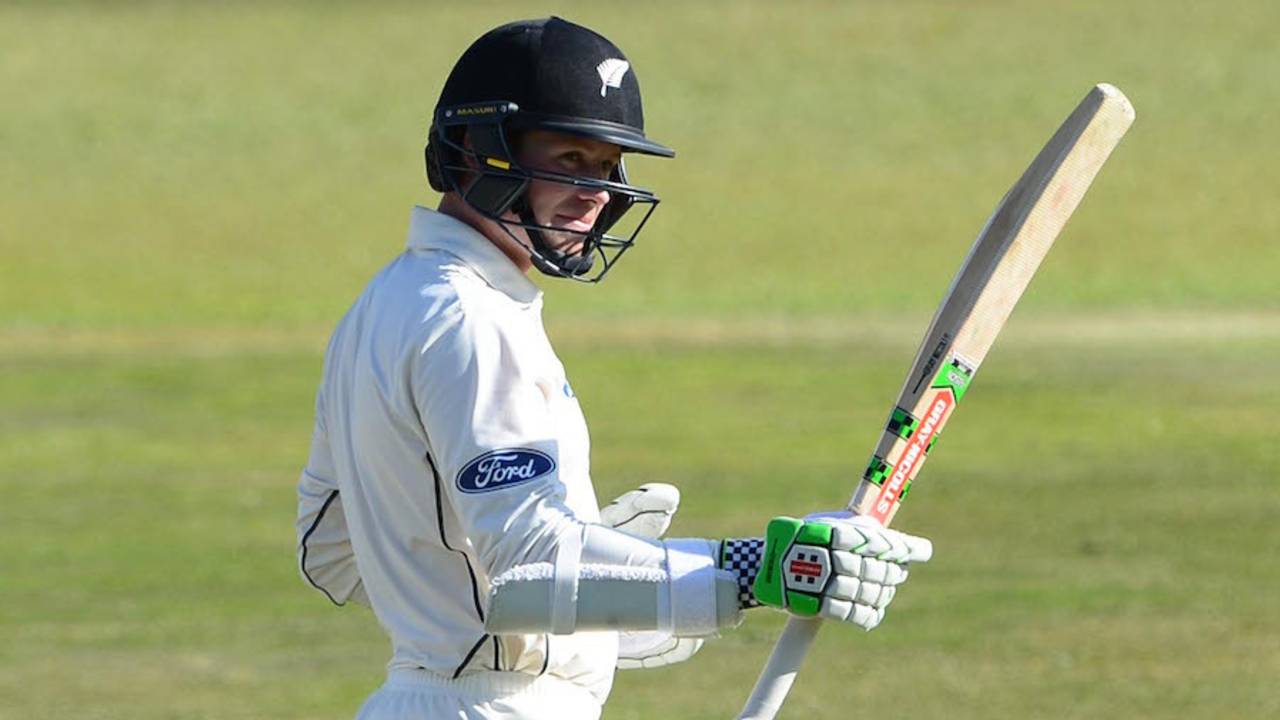Hesson points to lessons of adaptability from series loss
Despite losing the Test series to South Africa 0-1, New Zealand coach Mike Hesson was pleased that his young side had gained valuable experience on the tour
Firdose Moonda
31-Aug-2016
Henry Nicholls' gritty half-century in the second innings in Centurion suggests he could be a longer-term prospect for New Zealand in the line-up • Getty Images
Mike Hesson's eyes managed to not widen too much when he was reminded of New Zealand's next two Test assignments. In three weeks' time, they will take on the No.2 team in the world, India, in their own backyard and before the year is out, they will host the current No.1 side, Pakistan.
"It sounds quite daunting, doesn't it?" he said with a smile.
At the same time, it is exactly what New Zealand need as they look to climb the Test rankings and establish themselves as a side that is better than the bottom half of the table. They want to compete with strong teams, especially away from home, where Hesson believes they can develop their skills most. They are not too disappointed, therefore, with the 0-1 Test series loss to South Africa.
"Every country is challenged to try and win away from home but a big part (of getting better) is getting experiences into players," Hesson said. "For the guys that will be a big part of our future, the experiences will be invaluable. We can't replicate that at home."
In Centurion, New Zealand were faced with a surface that assisted seamers and had to bat on it facing some of the best in the world. Dale Steyn, Vernon Philander and Kagiso Rabada challenged them with swing and seam movement, pace and bounce. Hesson admitted some of his players' technical deficiencies were "exposed", but believed they will benefit from the experience. "In first-class cricket, they don't come across on a wicket like that and they don't face bowlers like that. That's important for us," Hesson said.
The batsman who got the most out of the Centurion Test was Henry Nicholls. After an underwhelming start to his Test career against Australia and struggles in Zimbabwe, Nicholls scored a career-best 76 in the second innings to suggest he could be a longer-term prospect for a New Zealand line-up that needs some beefing up after Brendon McCullum's retirement. "Henry is a man of very good character. Starting his Test career against Australia was a tough challenge and he is still learning his trade," Hesson said. "The experience he got here, against this quality of opposition, shows he has got a nice future for us."
Kane Williamson was the only other New Zealand batsman to score a half-century in the series and, with the added responsibility of leadership, can also regard the tour as a success. Hesson was pleased with the start Williamson had as captain. "Kane has done an excellent job. He involves a lot of senior players. It's a very inclusive style of leadership and it's one that will help the group grow," Hesson said. "I am looking forward to seeing how he grows."
The other big positive for New Zealand was the form of Neil Wagner. In 2016, Wagner has taken 27 wickets in five Tests at 18.66 and has made the third seamer's role his own. "In the last six months since the Test against Australia at the Hagley Oval, he has gone from strength to strength and has established himself as the third seamer," Hesson said. "He keeps running in and picks up top-order wickets - it's critical for us."
In Centurion, Wagner was pitted him against his former countrymen on his former home ground. The off-field chatter was dominated by pronunciation of Wagner's surname and banter over his history with the South African players. Hesson felt Wagner handled the extra needle well. "He is a combative character. That's a big part of who he is but he plays the game in good spirits. No quarter given and no quarter asked for."
A skill Wagner was not able to demonstrate in South Africa was reverse swing. The Durban Test did not go the distance and the pristine Centurion outfield did not allow the ball to scuff up enough, but this is something he will need to do India. Hesson has identified "reverse swing and spin" as the two major challenges and may be slightly disappointed that neither discipline was developed on this tour.
While New Zealand played two spinners, Mitchell Santner and Ish Sodhi, in Zimbabwe, there was only space for Santner in South Africa and Mark Craig went completely unused. As a trio, much more will be expected from them on New Zealand's next assignment "Our spinners have developed really nicely. We have got a talented spin attack; a young spin attack," Hesson said. "They showed at the World T20 that they can adapt."
Firdose Moonda is ESPNcricinfo's South Africa correspondent
